Frontline students
Chris Rothery, a man who is no stranger
to a uniform, stands us easy
as he explains the workings of Tennant Creek High School's cadet corps.
Our cadet unit is the newest in .the Northern
Territory if not in Australia. It's known as the 71 Platoon - Tennant
Creek. It was initially set up towards the end of last year but it really
got its act together in 1998.
There are approximately 40 cadets in the unit from Tennant Creek, all
of them at the moment are High School students - to be part of a cadet
unit you've got to be between 13 and 18 years of age. Being a cadet
is not the same of being in the Army. The Army Cadet Corps of Australia
are sponsored by the Army but are not officially a part of the Defence
Forces.
The aim of the cadets is to foster self reliance, self discipline, the
ability to work as a team and also, as a by-product, to hopefully engender
a respect for and perhaps an interest in the Defence Forces.
At the end of your cadets days you'll be aware of how the Army runs
and it may give you an opportunity to go into the Army as a career.
Certainly, those kids who would have been a cadet are advantaged in
terms of wanting to get into the Army.
Being in the cadets gives an insight into how the Army works and it
lets you get your hands on actual Army equipment, it lets you work with
Regular Army people. The soldiers who were on the cadet camp, apart
from the instructors like myself, are all full-time Army, both male
and female.
The cadets corps throughout Australia run an annual camp every year
and it's usually between 8 and 10 days. Our camp ran for about 8 days
and it was held at Annaburroo Station, just on the edge of Arnhem land.
From our unit we had 25 cadets attend and all up, including the other
Darwin units there was a total of 114 cadets. The cadets all slept under
the stars or under their Army issued Hootchies (which they had to learn
to put up).
They were living in the field with outside toilets, which many found
difficult to cope with. The cooking and the catering was done by the
regular Army, they had a field kitchen there, so they were very well
fed with 3 meals a day. There were portable showers which were rather
basic, which certainly a number of our cadets found a little confronting
to start off with.
Many of our cadets, because it was their first time away on a camp,
found it a little difficult that they couldn't go to the shop and they
couldn't have coca cola or lollies. For many of them it was probably
the first time in their lives that they had to do without those things
for a week!
The annual camp is a chance for all Army cadets in the Northern Territory
to come together to develop and to test the skills they have learnt
the preceding year back at their cadet bases. There are many types of
competitions - we had a sports day and Tennant Creek was very successful
at that - we had a very strong sporting team.
We tested out our navigation skills but because Tennant Creek is a new
unit, we hadn't had very much practice at that. We did water survival
skills, we did radio procedures using military radio equipment and probably
the highlight for many of the cadets was a range shoot using the Australian
Army's Styre weapon, the standard issue weapon given to all soldiers
in the Australian Army.
Basically it's a coming together, like a fellowship, testing and developing
skills and learning to work as a big team - all skills that are highly
sought after in the workplace.
Being a cadet gives people a background into the way the Army works,
it gives them a feeling for Army life, it shows them the many things
that will be expected of them if they go into the Defence Forces.
Many young people don't realise that the Armed Forces offer a very diverse
range of careers and quite often it's through this cadet experience
that they get an understanding of just how diverse the Defence Forces
are.
Cadets went out of fashion, particularly during the Vietnam war in the
60's and 70's cadets were not particularly popular. But now in the 80's
and 90's we are enjoying a resurgence for all sorts of reasons. I think
a lot of young people simply enjoy the outdoor life that it offers and
the skills that it teaches and the skills which make them better employable
for the future.
Many young people that go into the defence forces are encouraged to
continue their education. Quite often this may mean doing a TAFE course
or University course and getting a degree. The Army requires a high
level of education now, even to be an ordinary soldier. Once upon a
time people who wanted to go in as what's known as General Entry only
had to be able to stand up straight, be healthy and read and write -
that was enough.
These days that's not enough, they have to be literate, numerate and
on top of the modern technology. So to go into the Army these days,
even in the lowest level, they prefer that people would have completed
year 11 and 12, because there is quite a degree of competition to get
into the Army these days.
The philosophy of the Defence Forces is to train to defend and protect
Australia, even when there is no threat of war. So, much of the training
is still geared around developing skills to defend and protect Australia.
When they're not doing that they are often involved in community projects
or relief work in times of natural disasters.
The Tennant Creek unit is sponsored by the Second Cavalry Regiment in
Darwin and sponsored locally by the RSL branch. It's through that strong
support from the local RSL branch that we will be getting a lot of our
new equipment.
We'll be getting the latest compasses, satellite navigation equipment,
two- way radios etc. and that's all done through fundraising by the
RSL. They've been very strong in supporting us. In return, we intend
to be a community orientated cadet group, not strictly just working
along the Army lines, but also doing community projects as well and
that will come out as the unit develops.
The genesis of the Tennant Creek army cadet unit goes back to Dave Halford,
who is the president of the Tennant Creek RSL. He pushed very strongly
over a period of five years to try and get the cadet unit established
and it's taken his persistence and a lot of hard work to make this happen.
If it wasn't for strong community support and dedication on his part,
it just wouldn't have happened. He had to overcome a number of obstacles
but being the persistent person that he his and believing so strongly
in the benefits that the unit could have for the youth of Tennant Creek,
he persevered.
Thanks to Dave's efforts, Tennant Creek has Australia's newest and perhaps
boldest cadet unit and its benefits will be seen in the changing attitudes
of our students in areas such as self-esteem, self-confidence and general
life skills.
What the cadets had to say ...
What do you find most enjoyable about being in the
cadets?
Crystal Strickland: I'd say probably the skills and the trips
that we are able to go on and being able to be interactive with other
people.
Stevie Staunton: I enjoy it because it's a big group of us being
able to get together and do things such as learning new skills like
mapping work and getting to know more about the bush and what you can
do out there. It's good to be able learn a bit about the Australian
History as well.
Nicole Gillespie: I like being able to interact with kids from
other schools and find out what they have learnt at Army Cadets. You
learn heaps of self discipline in the cadets, which I think is also
very valuable.
Josh Buxton: I've actually got a rank in the cadets so I like
the leadership qualities that you are able to learn. I like that aspect,
the whole group is yours and you can tell them what to do!
Do you hope to further a career in the Army and what
would you want to specialise in?
Crystal Strickland: I'd like to pursue it for as long as I'm
in Tennant Creek and while I'm at school, but I don't know if I'd want
to continue with the Army when I get out of school.
Stevie Staunton: It doesn't look like a very big career thing
for me, but with the skills I'm learning now, it depends.
Nicole Gillespie: I reckon I'll keep doing cadets until I finish
school, but after school I don't think I will keep on going with it.
Josh Buxton: I'm going to do Army Cadets for as long as I can
and once I turn 17, I hope to join the Army. When I finish school I
will have figured out what I actually want to do or pursue in the Army.
What are some of the important things that being
a cadet teaches you?
Crystal Strickland: Teamwork definitely and discipline, in being
able to control your actions and understanding what the consequences
will be of your actions. It teaches you to respect older people as well,
it teaches you a lot of discipline which you need in life.
Stevie Staunton: It teaches you to respect others and to be able
to work as a group. It enables you to be able to interact with other
people and to be really cautious of what you're saying.
Nicole Gillespie: It teaches you to help people, you don't just
help yourself, you should look after others as well. It shows you what
sort of things are available in the Army, the sorts of things that the
Army can teach you.
Josh Buxton: Being in the Army teaches you how to be responsible.
Once you're in the Cadets and you're wearing a uniform, your friends
aren't just friends anymore, they're cadets and you don't regard each
other in quite the same way. It's responsibility mainly.
What did you enjoy most about the Cadet camp?
Crystal Strickland: The atmosphere was really different, I liked
it. It was something totally different from anything I had imagined.
We got to interact with a whole lot of different people, which was really
good. It taught us all a whole lot about self discipline and working
as a team.
Stevie Staunton: I liked it because we got to meet different
people from different camps. There were different and more people in
charge of us, we found out a lot about the RSM and higher ranks. The
camp gave me a wider view on being a cadet, it was definitely worthwhile.
The swim at the end of each day was the best thing to look forward to!
Nicole Gillespie: I liked the night activities when we had to
go out into the bush and hide, the swimming was probably the most fun,
and the food was really good too!
Josh Buxton: The people that we went away with in our group,
I had never really talked to much before we went away. But by the end
of the camp everybody was friends. The self discipline again, I mean
we had no electricity or anything like that, we had to get up really
early in the morning and go for a 5km run, so it was hard work.
What sort of activities did you participate in at
the camp?
Crystal Strickland: We did navigation exercises where we went
out in our cadet units and we had to find grid bearings on a map, we
had to use compasses. We had to find objects that were hidden in the
bush, using the skills we had learnt about navigation, that gave us
a sense of unity with our team. We also went out onto a range and learnt
how to shoot the Styre rifle.
Stevie Staunton: We had a team sports day and we did really well
in that, most of the other units were really surprised!
We slept out in the bush under hootchies, but we cheated because we
had stretcher beds and air mattresses! Next time though I think we'll
definitely pack lighter - we took too many bags and we had to carry
them around everywhere. I think just a backpack and a pillow will do
next time! It was definitely different sleeping under a hootchie!
Nicole Gillespie: One of the days we were separated into nine
different stations and we were given lessons on how to use radios and
what sort of crawls you have to do along the ground when you're trying
to hide. We also had to learn how to find someone if they were lost.
Josh Buxton: The activity that I mainly enjoyed was the lantern
stalk, where in the middle of the night we had to go out into untouched
bush and do various activities. The main aim of the camp was to try
and steal the other teams' mascot. For the whole week we had to protect
our mascot from being stolen.
Is there anything you don't like about being in the
cadets?
Crystal Strickland: I think when we were on the camp we should
have been given a bit more free time, because the days were so hectic
and by the end of the day we were stuffed! We didn't really get any
time to ourselves, but I suppose it goes with the territory.
Stevie Staunton: I found the first three days of the camp really
hectic, I was really shocked at how much hard work was involved! But
by the end of the week, I could have stayed another week, once we got
into it we found that it's all about teamwork.
Nicole Gillespie: The only thing I didn't like about the camp
was having to pack everything up at the end!
Josh Buxton: The hardest part was thinking when we first got
there that we were going to be there for a whole week!
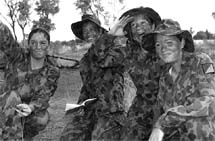
Stevie Staunton, Josh
Buxton, Crystal Strickland and Nicole Gillespie on patrol make their first
sighting of the enemy.
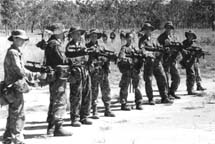
And last requests?
Be careful next time you argue over the change at the Food Barn Checkout.
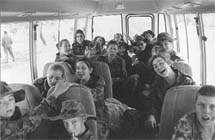
Hey ho, Hey ho, it's
off to work we go.
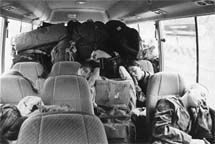
But on the way home
it was a different story!
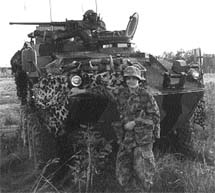
Adam McMahon poses
besides his dream car.

Lieutenant Chris Rothery,
Corporal Scott Andrew and Lieutenant Derek McPadden.
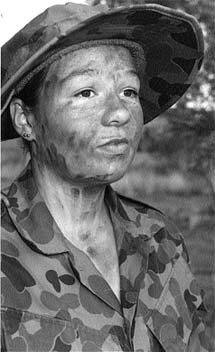
Cdt Crystal Strickland.
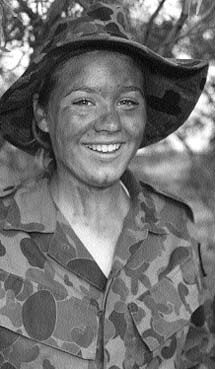
Cdt Nicole Gillespie.
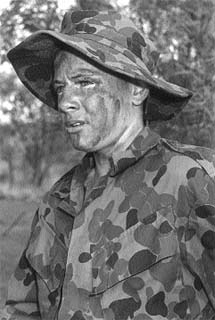
Cpl Josh Buxton.
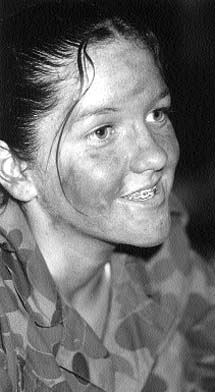
Cdt Stevie Staunton.